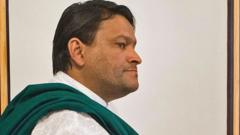Muhsin Hendricks' assassination in South Africa not only shakes the LGBTQ+ community but also highlights the ongoing struggle for acceptance within religious circles, prompting calls for justice and honoring his groundbreaking legacy.
Legacy of the First Openly Gay Imam: Muhsin Hendricks' Impact on LGBTQ+ Rights in South Africa

Legacy of the First Openly Gay Imam: Muhsin Hendricks' Impact on LGBTQ+ Rights in South Africa
The tragic killing of Muhsin Hendricks, the first openly gay imam, sparks fear and determination within South Africa's LGBTQ+ community to push for acceptance in religious spaces.
The recent execution-style killing of Muhsin Hendricks, a pioneering figure as the first openly gay imam in South Africa, has sent shockwaves through the LGBTQ+ community, igniting both fear and a renewed commitment to fight against marginalization within religious spaces. Hendricks, who was 57, met a tragic end in Gqeberha, where he was reportedly murdered while on his way to officiate at weddings, contradicting initial claims that he was conducting ceremonies for a gay couple. Instead, his Al-Gurbaah Foundation clarified that he was set to marry two interfaith heterosexual couples.
Hendricks' willingness to perform non-traditional marriage ceremonies represented his quest for inclusivity—challenging norms in a landscape where traditional imams in South Africa rarely officiate such unions. His drive to bridge the gap between Islamic faith and LGBTQ+ identity earned him both praise and criticism, with supporters viewing him as a light in the darkness for queer Muslims around the world.
Despite the constitutional protections for LGBTQ+ individuals in South Africa, Hendricks faced stark opposition from mainstream religious circles, particularly from organizations like the Muslim Judicial Council (MJC) and the United Ulama Council of South Africa (UUCSA). While they publicly condemned his murder, they also distanced themselves from Hendricks, describing him by his name alone rather than by religious titles. This contradiction underscores the complex dynamics of acceptance within the arena of religion and sexuality.
Living through a diversified personal journey, Hendricks previously had a heterosexual marriage and children before coming out as gay in 1996. He further stretched societal boundaries by marrying a Hindu man, and subsequently founded "The Inner Circle"—a support group aimed at aiding queer Muslims in reconciling their faith with their sexual identity.
Even in a country recognized for its advances in LGBTQ+ rights—being the first in Africa to legalize same-sex marriage—discrimination and violence persist. Religious doctrines often resist acknowledging same-sex unions, leaving only a handful of faith groups, like the Dutch Reformed Church and the Methodist Church of Southern Africa, as havens for inclusive practices.
The aftermath of Hendricks' death has raised concerns about safety among activists and has sparked a critical discussion on the continuing exclusion within faith communities—a groundbreaking conversation articulated by voices like Reverend Toni Kruger-Ayebazibwe, who affirmed that Hendricks’ legacy would live on through their ongoing fight for acceptance.
In a sobering reflection, Dr. Fatima Essop, an Islamic Studies senior lecturer, condemned the violent rhetoric multiplying on social media following the imam's death, asserting that no justification exists in Islam for such acts. While lamenting this tragic loss, she emphasized the importance of compassion that should underpin faith practices.
As Hendricks has already been laid to rest, a memorial celebration is anticipated, organized by his foundation to honor his vital contributions to both LGBTQ+ rights and religious discourse. Teboho Klaas from The Other Foundation encapsulated the sentiment within the community, remarking that although Hendricks' life was cut short, his legacy would continue to inspire future generations.



















